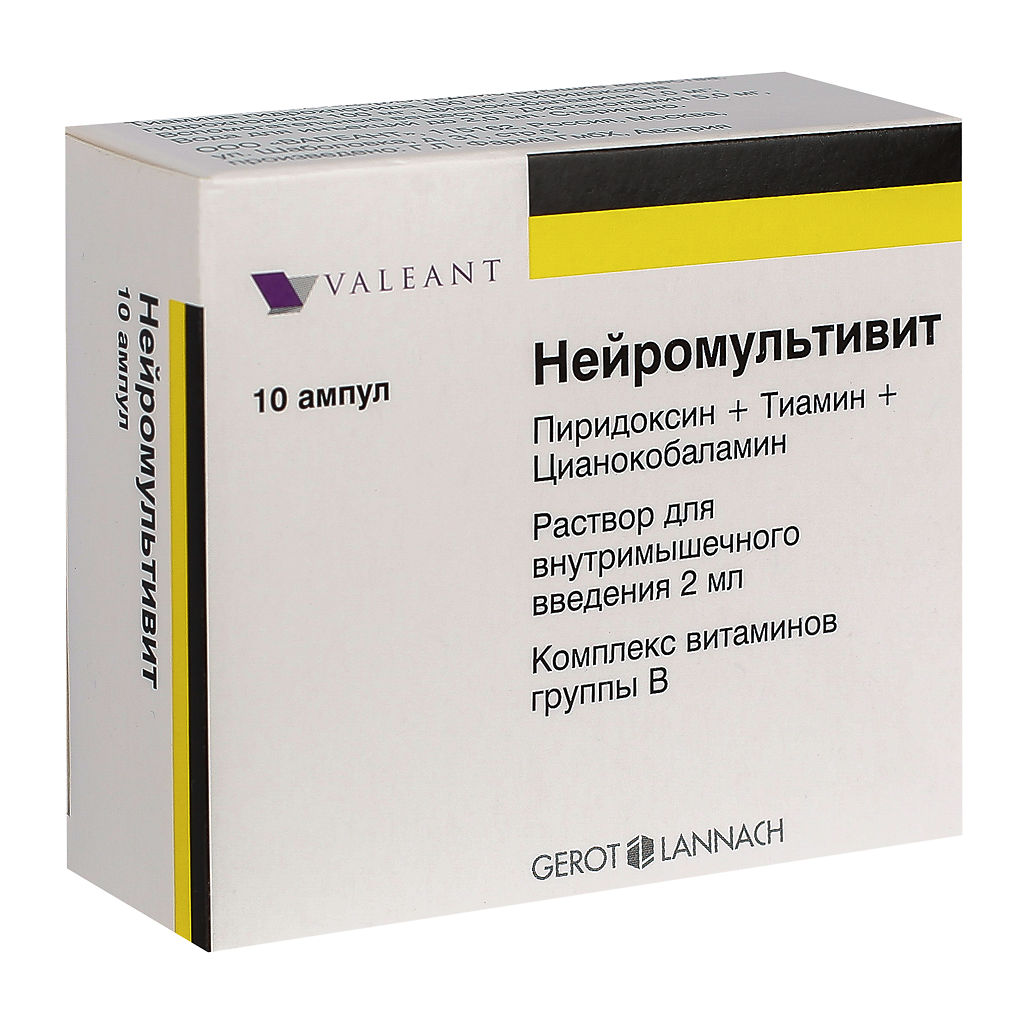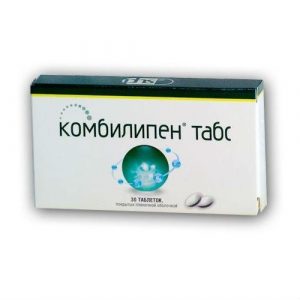Description
Release form
solution for intramuscular injection
Pharmacological action
Pharmacological action is determined by the properties of vitamins that make up the drug. The drug contains vitamins B1 (thiamine), B6 (pyridoxine) and B12 (cyanocobalamin), a deficiency of which can lead to neurological disorders, mainly from the peripheral nervous system.
Neurotropic B vitamins have a beneficial effect on inflammatory and degenerative diseases of the nerves and the motor apparatus. They enhance blood flow and improve the functioning of the nervous system.
Thiamine is a cofactor of enzymes that transfer bicarbon groups in decarboxylation reactions, plays a key role in carbohydrate metabolism, as well as in the Krebs cycle, followed by participation in the synthesis of TPP (thiamine pyrophosphate) and ATP (adenosine triphosphate).
Pyridoxine is a cofactor of transaminases, is involved in the metabolism of protein, and in part, in the metabolism of carbohydrates and fats.
The physiological function of both vitamins is the potentiation of each other’s actions, which manifests itself in a positive effect on the nervous, neuromuscular and cardiovascular systems.
The drug quickly compensates for the deficiency of these vitamins.
Cyanocobalamin is a cofactor in the transfer of monocarbon groups, participates in the synthesis of the myelin sheath, stimulates hematopoiesis, reduces pain associated with damage to the peripheral nervous system, and stimulates nucleic acid metabolism via activation of folic acid.
Pharmacokinetics:
After intramuscular injection, thiamine is rapidly absorbed from the injection site and enters the bloodstream (484 ng / ml after 15 minutes on the first day of a dose of 50 mg) and is not evenly distributed in the body when it contains 15% in leukocytes and 75% red blood cells and in plasma 10%.
Thiamine crosses the blood-brain and plancent barriers and is found in breast milk. Thiamine is excreted in the urine in the alpha phase after 0.15 hours, in beta phase – after 1 hour and in the terminal phase – within 2 days. The main metabolites are: thiamine carboxylic acid, pyramine and some unknown metabolites. Of all the vitamins, thiamine is stored in the body in the smallest quantities. The adult body contains about 30 mg of thiamine in the form of 80% thiamine pyrophosphate, 10% thiamine triphosphate and the rest in the form of thiamine monophosphate.
After intramuscular administration, pyridoxine is rapidly absorbed into the bloodstream and distributed in the body, acting as a coenzyme after phosphorylation of the CH2OH group in the 5th position, forms a metabolically active pyridoxalphosphate. About 80% of the vitamin binds to plasma proteins.
Pyridoxine is distributed throughout the body and crosses the placenta and is found in breast milk, deposited in the liver and oxidized to 4-pyridoxic acid, which is excreted in the urine, a maximum of 2 to 5 hours after absorption. The human body contains 40-150 mg of vitamin B6 and its daily elimination rate of about 1.7-3.6 mg with a replenishment rate of 2.2-2.4%.
After parenteral administration, cyanocobalamin forms complexes with the transcobalamin transport protein, which are rapidly absorbed by the liver, bone marrow, and other organs. Cyanocobalamin is excreted in the bile and takes part in the intestinal-hepatic circulation. Penetrates through the placenta.
Indications
In the complex treatment of the following neurological diseases accompanied by a deficiency of B vitamins:
– polyneuropathy (diabetic, alcoholic)
– intercostal neuralgia
– trigeminal neuralgia
– facial neuritis caused by degenerative changes in the spine
– cervical syndrome
– shoulder-scapular syndrome
– lumbar syndrome
– lumbar ischalgia.
Use during pregnancy and lactation
Use during pregnancy and breastfeeding is contraindicated.
Special instructions
The drug should be administered exclusively intramuscularly and should not be allowed to enter the bloodstream.
In case of unintentional intravenous administration, medical supervision (for example, in a hospital setting) is necessary, depending on the severity of the symptoms.
Impact on the ability to drive transp. Wed and fur .:
There is no information on the warning regarding the use of the drug Neuromultivit by drivers of vehicles and persons working with potentially dangerous mechanisms.
Composition of
1 ampoule contains:
active ingredients:
thiamine hydrochloride 100.00 mg
pyridoxine hydrochloride 100.00 mg
cyanocobalamin 1, 00 mg
excipients:
diethanolamine 5.0 mg
water for injection up to 2.0 ml
Dosage and administration of
Dosing regimen
For severe pain, treatment begins with intramuscular injection (deep) of 2 ml of the drug, daily, for 5-10 days and then, with a transition to more rare injections (2-3 times a week) within 2-3 weeks.
Recommended weekly medical follow-up.
It is recommended that you go as soon as possible to the intake of Neuromultivit in the dosage form film-coated tablets.
Intravenous administration is not allowed.
Side effects of
The following concepts and frequencies apply: very often (? 1/10), (often (? 1/100,
from the immune system:
rare: allergic reactions (urticaria, pruritus, pruritus, angioedema, shortness of breath, anaphylactic shock).
From the gastrointestinal tract:
in some cases: nausea, vomiting.
From the cardiovascular system:
in some cases: tachycardia, increased sweating.
Very rarely skin and subcutaneous tissue:
: increased sweating, acne.
From the nervous system:
Very rarely: dizziness, confusion.
General disorders and disorders at the injection site:
in some cases: irritation at the injection site may occur with rapid administration (for example, due to unintentional intravascular injection or injection into tissues with high blood supply) or systemic reactions may develop when the dose is exceeded: confusion , vomiting, bradycardia, arrhythmia, dizziness, convulsions.
Overdose
Overdose symptoms: confusion, vomiting, bradycardia, arrhythmia, dizziness, convulsions.
Treatment: symptomatic.
Storage Conditions
At 2 ° C to 8 ° C.
For patients: allowed to store the drug at a temperature not higher than 25 ° C for 14 days.
Keep out of the reach and sight of children.
Expiration
2 years.
Do not use after the expiry date stated on the package.
active substance
Pyridoxine , Thiamine, Cyanocobalamin
lekarstvennaja form
Solution for
Indications
From lumbago, From sciatica, From neuritis, From ternary neuralgia
Possible product names
Neuromultivitis solution for in / mouse. introduction. 2 ml ampoule 10 pcs.


